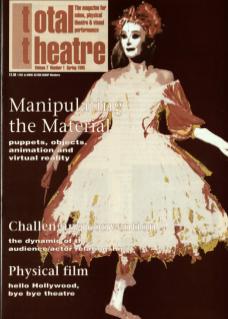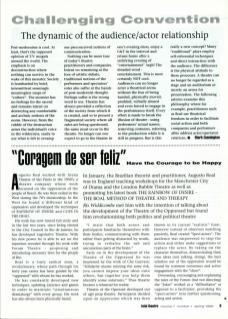Postmodernism is cool. At least, that's the supposed opinion of TV moguls around the world. The emphasis is on deconstruction where nothing can survive in the wake of this monster. Society is bombarded by brief, intermittent seemingly meaningless snaps of ‘culture’. The monster has no feelings for the sacred and remains intent on destroying any comfortable and archaic notions of the norm. However, from the rubble of the destruction arises the individual's voice in the wilderness, ready to use what is left to revamp our preconceived notions of communication.
Nothing can be more true of today's theatre practitioners and companies. Intent on remaining at the fore of artistic debate, traditional notions of the performers and spectators' roles also suffer at the hands of postmodernist thought. Perhaps suffer is the wrong word to use. Theatre has always provided a reflection of the society from which it is created, and so to present a fragmented society where all rules are being questioned, the same must occur in the theatre. No longer can one expect to go to the theatre in one's evening dress, enjoy a G&T in the interval and return home after a satisfying evening of ‘entertainment’. Argh! The dreaded word – entertainment. This is most certainly NOT cool. Audiences can no longer enter a theatrical arena without the fear of being hassled, physically moved, prodded, verbally abused, and even forced to engage in the performance itself. Every effort is made to break the illusion of theatre – using performers' actual names, removing costumes, referring to the production while it is still in progress. But is this really a new concept? Many ‘traditional’ plays employ self-referential techniques and direct interaction with the audience. The difference is the physical attitude to these processes. A theatre can no longer be regarded as a stage and an auditorium or merely an arena for presentation. The following articles examine this philosophy where, for example, practitioners such as Boal use theatrical freedom in order to facilitate social action and both companies and performers alike address actor/spectator relations.

